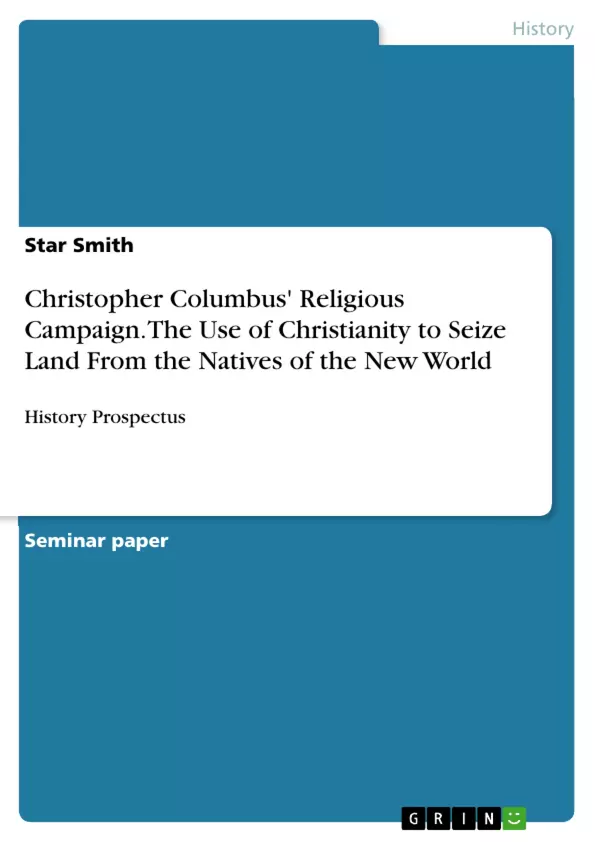In the late 1400s, commerce and religion linked many nations. The Ottoman Empire blocked direct contact between Europe and Asia, which caused oceanic trade to become a major undertaking for nations wanting to continue to exchange commodities. As Christianity grew in Europe, the upper class made it their duty to spread the faith to other nations. Certain monarchs used it to conquer and control other nations. Spain, the poster child for the Christian religion relied heavily on it as a warfare tactic. In 1492 Queen Isabella 1, also known as Isabel "The Catholic" reclaimed Granada from the Moors, sent Christopher Columbus to India to spread Christianity and began the process of exiling the Jews from Spain. Her passion for Christianity was so strong that in 1974 the Catholic Church of Rome granted the title "Servant of God".
Isabel funded the voyage of sea captain, Christopher Columbus to sail to India and convert them from Islam to Christianity. My paper will prove that religion was the motive for Columbus' voyage west and present evidence that he used Christianity to conquer the Americas and dispossess the Indians of their land. This thesis is important because it is different from other studies of Columbus Voyage that historically claim was to prove the earth round, to find a different trade rate or search for gold. Proving that Columbus was motivated by Christianity shows how powerful religious influence is in order to maintain a heightened awareness of future religious movements that could possibly be detrimental to society.
Table of Contents
- Introduction-Project Overview and Significance
Objectives and Key Themes
The objective of this paper is to demonstrate that Christopher Columbus's voyages were primarily motivated by religious zeal, specifically the desire to spread Christianity and ultimately aid in the recapture of Jerusalem. It challenges the commonly held belief that his voyages were driven by scientific curiosity, the search for new trade routes, or the pursuit of gold.
- The role of religion in motivating Columbus's voyages.
- The use of Christianity as a tool for conquest and dispossession of indigenous populations.
- The debunking of the myth that Columbus's voyages were primarily for scientific discovery.
- The connection between Columbus's ambitions and the broader context of the Crusades.
- The influence of Marco Polo's accounts on Columbus's plans.
Chapter Summaries
Introduction-Project Overview and Significance: This introduction lays out the central argument: that Christopher Columbus's voyages were primarily motivated by a religious desire to spread Christianity and ultimately contribute to the recapture of Jerusalem from Muslim control. It contrasts this with other historical interpretations that emphasize scientific exploration, trade, or the search for gold. The introduction highlights Queen Isabella I's strong religious convictions and her role in funding Columbus's voyages, emphasizing the intertwined nature of commerce and religion in the late 15th century. It also underscores the significance of the thesis, arguing that understanding Columbus's religious motivations offers crucial insights into the power of religious influence and its potential consequences. The author references Columbus's journal and other historical accounts to support the claim that converting the Grand Khan to Christianity was a key objective, ultimately aiming to use the resulting resources to support a crusade to retake Jerusalem. The introduction establishes the paper's intention to challenge long-held assumptions about Columbus's motives.
Keywords
Christopher Columbus, Christianity, religious motivation, conquest, colonization, Jerusalem, Crusades, Grand Khan, Queen Isabella I, Marco Polo, debunking myths, historical interpretation.
Frequently Asked Questions: A Comprehensive Language Preview
What is the main argument of this paper?
The central argument is that Christopher Columbus's voyages were primarily driven by religious zeal, specifically the desire to spread Christianity and contribute to the recapture of Jerusalem. This challenges the common belief that his motivations were primarily scientific curiosity, trade, or the pursuit of gold.
What role did religion play in motivating Columbus's voyages?
The paper emphasizes the significant role of religion in motivating Columbus. It argues that converting the Grand Khan to Christianity and using the resulting resources to support a crusade to retake Jerusalem were key objectives.
How does the paper address the commonly held beliefs about Columbus's motivations?
The paper directly challenges the widely accepted interpretations that emphasize scientific exploration, trade, or the search for gold as the primary drivers of Columbus's voyages. It presents a counter-narrative focused on religious motivations.
What is the significance of Queen Isabella I's role in this narrative?
Queen Isabella I's strong religious convictions and her crucial role in funding Columbus's voyages are highlighted. The paper emphasizes the interconnectedness of commerce and religion in the late 15th century, showcasing how these factors influenced the voyages.
What sources does the paper use to support its argument?
The paper references Columbus's journal and other historical accounts to support its claim that converting the Grand Khan to Christianity was a key objective.
What are the key themes explored in the paper?
Key themes include the role of religion in motivating Columbus's voyages, the use of Christianity as a tool for conquest, the debunking of myths surrounding Columbus's motives, the connection between Columbus's ambitions and the Crusades, and the influence of Marco Polo's accounts on Columbus's plans.
What are the main chapters covered in the preview?
The preview includes an introduction outlining the project overview and significance.
What keywords are associated with this paper?
Keywords include Christopher Columbus, Christianity, religious motivation, conquest, colonization, Jerusalem, Crusades, Grand Khan, Queen Isabella I, Marco Polo, debunking myths, and historical interpretation.
- Quote paper
- Star Smith (Author), 2012, Christopher Columbus' Religious Campaign. The Use of Christianity to Seize Land From the Natives of the New World, Munich, GRIN Verlag, https://www.grin.com/document/300739



